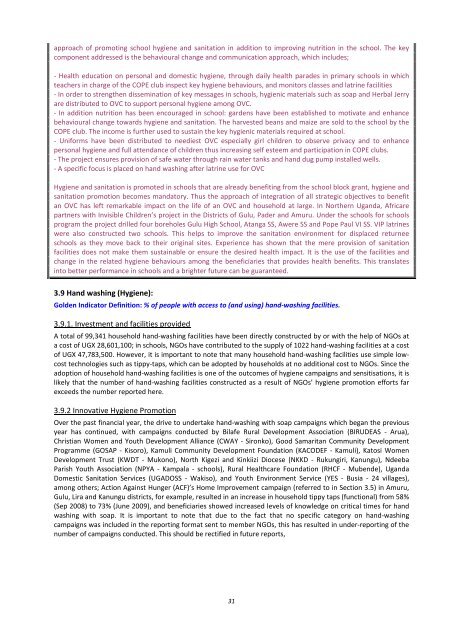Download to Read More - UWASNET
Download to Read More - UWASNET
Download to Read More - UWASNET
You also want an ePaper? Increase the reach of your titles
YUMPU automatically turns print PDFs into web optimized ePapers that Google loves.
approach of promoting school hygiene and sanitation in addition <strong>to</strong> improving nutrition in the school. The key<br />
component addressed is the behavioural change and communication approach, which includes;<br />
- Health education on personal and domestic hygiene, through daily health parades in primary schools in which<br />
teachers in charge of the COPE club inspect key hygiene behaviours, and moni<strong>to</strong>rs classes and latrine facilities<br />
- In order <strong>to</strong> strengthen dissemination of key messages in schools, hygienic materials such as soap and Herbal Jerry<br />
are distributed <strong>to</strong> OVC <strong>to</strong> support personal hygiene among OVC.<br />
- In addition nutrition has been encouraged in school: gardens have been established <strong>to</strong> motivate and enhance<br />
behavioural change <strong>to</strong>wards hygiene and sanitation. The harvested beans and maize are sold <strong>to</strong> the school by the<br />
COPE club. The income is further used <strong>to</strong> sustain the key hygienic materials required at school.<br />
- Uniforms have been distributed <strong>to</strong> neediest OVC especially girl children <strong>to</strong> observe privacy and <strong>to</strong> enhance<br />
personal hygiene and full attendance of children thus increasing self esteem and participation in COPE clubs.<br />
- The project ensures provision of safe water through rain water tanks and hand dug pump installed wells.<br />
- A specific focus is placed on hand washing after latrine use for OVC<br />
Hygiene and sanitation is promoted in schools that are already benefiting from the school block grant, hygiene and<br />
sanitation promotion becomes manda<strong>to</strong>ry. Thus the approach of integration of all strategic objectives <strong>to</strong> benefit<br />
an OVC has left remarkable impact on the life of an OVC and household at large. In Northern Uganda, Africare<br />
partners with Invisible Children’s project in the Districts of Gulu, Pader and Amuru. Under the schools for schools<br />
program the project drilled four boreholes Gulu High School, Atanga SS, Awere SS and Pope Paul VI SS. VIP latrines<br />
were also constructed two schools. This helps <strong>to</strong> improve the sanitation environment for displaced returnee<br />
schools as they move back <strong>to</strong> their original sites. Experience has shown that the mere provision of sanitation<br />
facilities does not make them sustainable or ensure the desired health impact. It is the use of the facilities and<br />
change in the related hygiene behaviours among the beneficiaries that provides health benefits. This translates<br />
in<strong>to</strong> better performance in schools and a brighter future can be guaranteed.<br />
3.9 Hand washing (Hygiene):<br />
Golden Indica<strong>to</strong>r Definition: % of people with access <strong>to</strong> (and using) hand-washing facilities.<br />
3.9.1. Investment and facilities provided<br />
A <strong>to</strong>tal of 99,341 household hand-washing facilities have been directly constructed by or with the help of NGOs at<br />
a cost of UGX 28,601,100; in schools, NGOs have contributed <strong>to</strong> the supply of 1022 hand-washing facilities at a cost<br />
of UGX 47,783,500. However, it is important <strong>to</strong> note that many household hand-washing facilities use simple lowcost<br />
technologies such as tippy-taps, which can be adopted by households at no additional cost <strong>to</strong> NGOs. Since the<br />
adoption of household hand-washing facilities is one of the outcomes of hygiene campaigns and sensitisations, it is<br />
likely that the number of hand-washing facilities constructed as a result of NGOs’ hygiene promotion efforts far<br />
exceeds the number reported here.<br />
3.9.2 Innovative Hygiene Promotion<br />
Over the past financial year, the drive <strong>to</strong> undertake hand-washing with soap campaigns which began the previous<br />
year has continued, with campaigns conducted by Bilafe Rural Development Association (BIRUDEAS - Arua),<br />
Christian Women and Youth Development Alliance (CWAY - Sironko), Good Samaritan Community Development<br />
Programme (GOSAP - Kisoro), Kamuli Community Development Foundation (KACODEF - Kamuli), Ka<strong>to</strong>si Women<br />
Development Trust (KWDT - Mukono), North Kigezi and Kinkiizi Diocese (NKKD - Rukungiri, Kanungu), Ndeeba<br />
Parish Youth Association (NPYA - Kampala - schools), Rural Healthcare Foundation (RHCF - Mubende), Uganda<br />
Domestic Sanitation Services (UGADOSS - Wakiso), and Youth Environment Service (YES - Busia - 24 villages),<br />
among others; Action Against Hunger (ACF)’s Home Improvement campaign (referred <strong>to</strong> in Section 3.5) in Amuru,<br />
Gulu, Lira and Kanungu districts, for example, resulted in an increase in household tippy taps (functional) from 58%<br />
(Sep 2008) <strong>to</strong> 73% (June 2009), and beneficiaries showed increased levels of knowledge on critical times for hand<br />
washing with soap. It is important <strong>to</strong> note that due <strong>to</strong> the fact that no specific category on hand-washing<br />
campaigns was included in the reporting format sent <strong>to</strong> member NGOs, this has resulted in under-reporting of the<br />
number of campaigns conducted. This should be rectified in future reports,<br />
31



